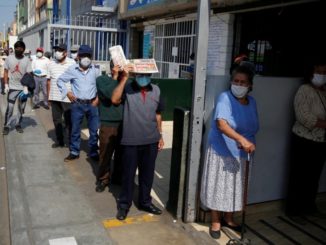
SANTIAGO – Polling stations opened in Chile on Sunday for a historic referendum on whether to change a dictatorship-era constitution seen as underpinning the nation’s glaring inequalities.
The vote comes a year to the day after more than one million people thronged downtown Santiago at the start of a mass wave of social unrest that left 30 people dead and thousands wounded.
More than 300,000 people are registered to vote at the Stadium, which achieved infamy as torture center during Augusto Pinochet’s 1973-1990 dictatorship.
President Sebastian Pinera called on Chileans to turn out in numbers to vote after he cast his ballot early in an upmarket area of the capital.
“Tonight when we learn the results, whatever the outcome may be, let’s respect people’s choice and make a firm and clear stand for democracy and not anarchy, for peace and not violence, for unity and not division.” Chile’s billionaire leader has not come out publicly for either side in the referendum campaign, and his conservative political grouping is divided on the issue.
Ya voté, ¿y usted?
Hoy vivimos un día histórico. Les pido que se sumen y voten para que todas las voces sean escuchadas. Así fortalecemos nuestra democracia, sana convivencia y construimos todos juntos un mejor Chile para todos. #ChileVotaXChile pic.twitter.com/ywnudADaxq
— Sebastian Piñera (@sebastianpinera) October 25, 2020
More than 14 million Chileans are eligible to vote and are expected to turn out in numbers, although the coronavirus pandemic, which has hit Chile hard, has added uncertainty to the likely turnout.
Tables, chairs and other furniture have been disinfected in all voting centers, which will stay open two hours longer than usual to allow voters enough time and avoid overcrowding.
Chile surpassed 500,000 Covid-19 cases on Saturday, with nearly 14,000 deaths.
Demand for a new constitution had been a recurring theme of the protests, set off by a hike in public transport fares. They rapidly turned into widespread demonstrations against social and economic inequalities — encompassing health, education and pensions — inherited from Pinochet’s rule.
The protest movement, which had daily drawn thousands onto the streets, reached critical mass on October 25, 2019, and within weeks Pinera had agreed to initiate a process to draft a new constitution.
Chileans are asked two questions on the ballot papers: to approve or reject a new constitution, and if necessary, what kind of body should draft it — a mixed assembly composed equally of lawmakers and citizens, or a 155-member convention made up entirely of citizens.
Opinion polls show more than 70 percent support a new constitution, with just 17 percent voting for rejection.
Polls also indicate similar backing for a constituent all-citizen convention, to be elected in April 2021.
Their draft would be put to another referendum in 2022.
Rejectionists, including conservative lawmakers, warn that the constitutional process could undermine the decades of economic stability underpinned by the existing constitution, and deter foreign investment.
Their fears are fueled by the violence that accompanied the protests.–AFP



